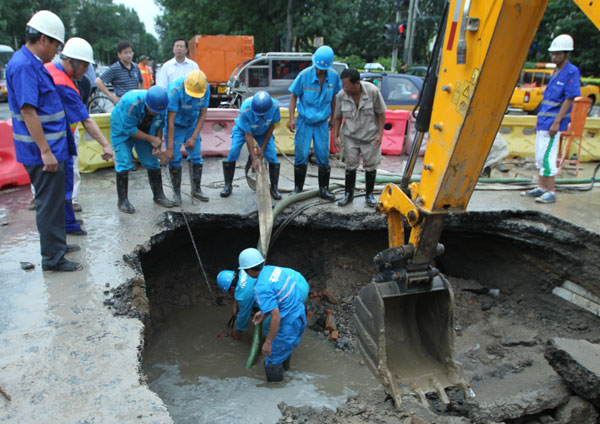
 |
|
Workers repair a section of collapsed road in Chaoyang district in Beijing on Wednesday. Wang Jing / China Daily |
With persistent rains battering Beijing, the number of collapsed pavements has been soaring, the city's road and bridge maintenance authority said on Wednesday.
Since the floods on July 21, the Beijing Municipal Bridge Maintenance Management Group, a State-owned enterprise that repairs bridges and roads, has received nearly 300 calls reporting collapses.
"Our hotline operators have received about 25 calls a day after the heavy downpour," said an employee in the emergency information department of the group, who declined to be identified.
On Wednesday morning, a pavement on the crossing between Huajiadi Street and Wanghua Road, in Chaoyang district, caved in, leaving a hole 2 meters deep by more than 10 square meters wide.
No one was injured, the employee said.
According to the maintenance group, the collapse was caused by loosened soils that were eroded by the persistent rains and by leaks in underground water pipes.
A 30-year-old driver named Tang said that even though the collapses are not frequent, he is constantly anxious due to the recent heavy rains.
On Tuesday afternoon, a man was slightly injured after he fell through a collapsed pavement on the northern part of Baiyun Road, 400 meters from the Muxidi subway station on Chang'an Avenue in Xicheng district, according to the district government's micro blog.
The collapse is believed to be linked to recent repairs of underground electricity pipes in the area, the micro blog said.
The employee with the Beijing maintenance group said that they have dispatched 2,561 workers to deal with collapsed pavements or waterlogged areas in business districts.
"Our workers can repair small holes, with about 1 or 2 square meters, within 24 hours, but for bigger ones we need to work up a plan and think about the underground pipes for natural gas and water," he said.
The group's patrol teams have covered the whole city, paying special attention to lower-ground sections under bridges or on roads, he said.
"We've also used radar vans to estimate underground conditions and help maintenance workers," he added.
In addition, the Beijing government also posted a message on its micro blog providing the maintenance group's hotline and asking people to call the police if they spot dangerous areas.
However, Jiang Zhongguang, a city planning professor at the Beijing University of Civil Engineering and Architecture, said the key problem behind the collapsed pavements is lack of regular maintenance.
"Workers didn't fill holes thoroughly and left some gaps, which caused soil erosion," he said, adding the gaps become potential risks in heavy rains.
"The weather is out of our control, but other problems can be solved with regular maintenance," Jiang said.
Li Yu contributed to this story.







